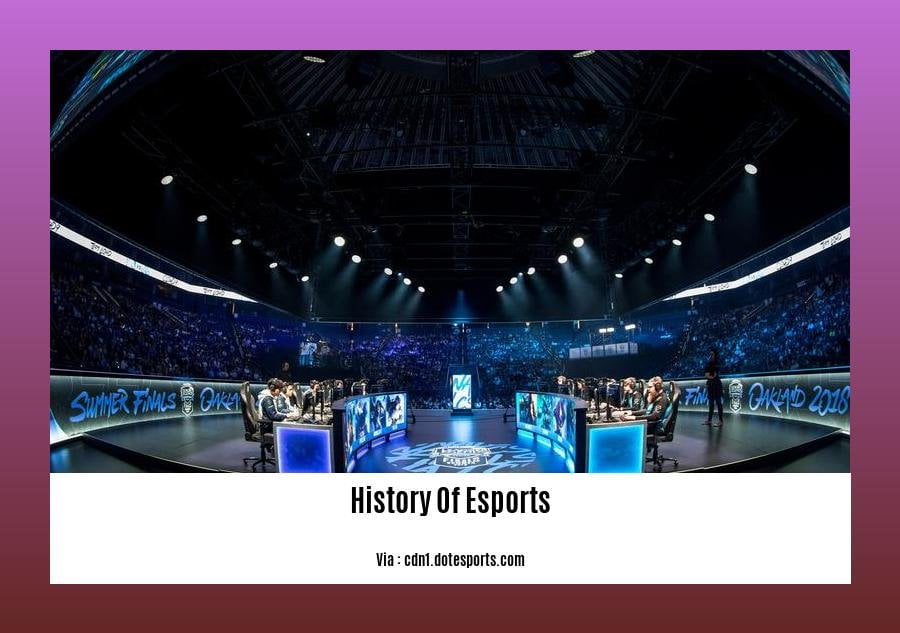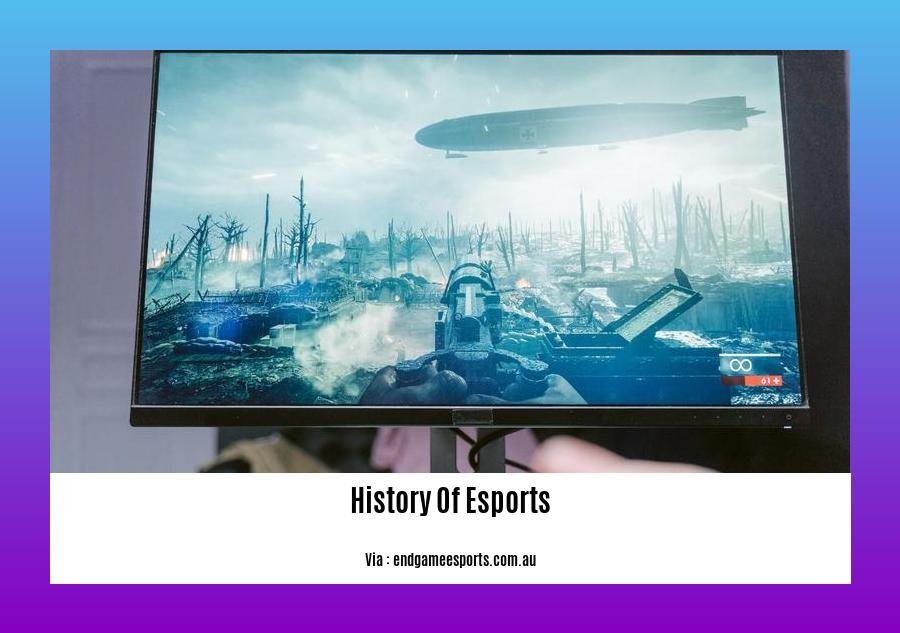Journey through the annals of esports in [- A Retrospective Look: Unveiling the History of Esports and Its Meteoric Rise]. From humble beginnings to a global phenomenon, discover the captivating narrative of competitive gaming’s evolution, the legendary players who shaped it, and the groundbreaking moments that fueled its meteoric ascent.
Key Takeaways:
-
The inception of esports can be traced back to 1972 with the “Intergalactic Spacewar Olympics.”
-
Arcades served as popular venues for competitive gaming in the 1980s, particularly for fighting games.
-
The advent of the Internet in the 1990s catalyzed the growth of esports, with games like “Doom” and “Quake” pioneering online multiplayer competitions.
-
The 2000s witnessed the emergence of modern esports, characterized by dedicated organizations, sponsorships, and live events, driven by games like “Counter-Strike,” “Dota 2,” and “League of Legends.”
-
Esports achieved mainstream acceptance as a legitimate sport and entertainment industry.
-
Continued expansion and diversification marked esports in recent years, encompassing mobile gaming, virtual and augmented reality, and cross-platform competitions.
History Of Esports

Esports, the captivating fusion of competitive gaming and digital entertainment, has woven a rich tapestry of history, punctuated by milestones and transformative moments. From humble origins to its current status as a global phenomenon, the history of esports is a compelling tale of technological innovation, human passion, and the unyielding pursuit of victory.
Genesis: The Early Flickers of Rivalry
In the annals of esports history, the 1972 “Intergalactic Spacewar Olympics” at Stanford University stands as a pioneering event. This rudimentary tournament, featuring the game “Spacewar!”, ignited the spark of competitive gaming, setting the stage for future developments.
The 1980s witnessed the rise of gaming modes such as deathmatch and capture the flag, fostering a fertile ground for competitive play. Arcades became bustling hubs of gaming prowess, particularly for fighting games like “Street Fighter II” and “Mortal Kombat,” where players honed their skills and forged rivalries.
The Internet Revolution: A Gateway to Global Competition
The advent of the Internet in the 1990s marked a watershed moment for esports history. Online gaming platforms, such as the first-person shooter “Doom” and the arena shooter “Quake,” opened up new avenues for multiplayer competition, connecting players from around the world in virtual battlefields.
This digital connectivity catalyzed the formation of esports leagues and structured tournaments, providing a framework for organized competition. In South Korea, “StarCraft” and “Warcraft” became national obsessions, captivating audiences with their strategic depth and exhilarating matches.
The 2000s and Beyond: A New Era of Professionalism and Global Dominance
The new millennium heralded the dawn of modern esports, characterized by the rise of dedicated esports organizations, sponsorships, and live events. Games like “Counter-Strike,” “Dota 2,” and “League of Legends” emerged as cornerstones of the esports industry, captivating millions of fans worldwide with their intricate gameplay and million-dollar prize pools.
Esports tournaments and leagues grew in scale and prestige, attracting top-tier players and teams from around the globe. The mainstream acceptance of esports as a legitimate sport and entertainment industry gained momentum, with traditional sports organizations and media outlets taking notice of its burgeoning popularity.
The Future Unfolds: Uncharted Territories and Limitless Potential
The history of esports is far from complete, as the industry continues to expand and evolve at an astonishing pace. Mobile gaming and esports on platforms like smartphones and tablets are rapidly gaining traction, opening up new frontiers for competitive play.
Virtual reality and augmented reality technologies are poised to transform the esports landscape, offering immersive and interactive experiences that blur the lines between the physical and digital worlds. Cross-platform play and esports competitions across multiple platforms are also gaining steam, fostering inclusivity and accessibility.
The future of esports is a canvas of boundless possibilities, where innovation and creativity will continue to shape its trajectory. With its captivating storylines, nail-biting competitions, and passionate community, esports stands poised to scale even greater heights, leaving an indelible mark on the annals of digital entertainment.
Uncover the riveting history of esports tournaments that have captivated the global gaming community over the years.
Dive into the history of esports events and witness the evolution of competitive gaming from its humble beginnings to the grand spectacles that they are today.
Discover a list of esports tournaments that have made their mark in the world of competitive gaming, showcasing the top players and teams that have battled it out for glory and recognition.
Learn more about what esports tournaments entail, including their formats, rules, and the various games that are featured in these thrilling competitions.
Explore the biggest esports event in history and relive the moments that made it a truly unforgettable spectacle, leaving an indelible mark on the world of competitive gaming.
Professionalization of esports and the rise of esports teams

From grassroots gaming competitions to multi-million dollar leagues, esports has come a long way. Here are some key points on how this captivating field has evolved:
Key Takeaways:
- In the early days of esports, competitive gaming was dominated by small, independent teams.
- As the industry matured, professional organizations began to emerge, signing players to contracts and providing them with salaries and benefits.
- The rise of streaming platforms such as Twitch and YouTube has helped to further popularize esports, attracting new fans and sponsors.
The Early Days of Esports:
Competitive gaming can trace its roots to the early days of computers. In the 1970s and 1980s, arcades were popular gathering places for gamers, and competitions were often held to determine who was the best at a particular game.
As home consoles and personal computers became more powerful, competitive gaming began to move out of the arcades and into the living room. Games like Street Fighter II and Quake became popular for competitive play, and small, independent teams began to form to compete against each other.
Professionalization and the Rise of Esports Teams:
In the early 2000s, the esports industry began to mature, and professional organizations began to emerge. These organizations signed players to contracts and provided them with salaries and benefits, similar to traditional sports teams.
The rise of streaming platforms such as Twitch and YouTube helped to further popularize esports, attracting new fans and sponsors. Today, esports is a multi-billion-dollar industry with major leagues and tournaments around the world.
The Impact of Professionalization:
The professionalization of esports has had a number of positive impacts on the industry. It has helped to legitimize esports as a sport, attract new fans and sponsors, and provide opportunities for players to compete at a high level.
Conclusion:
The professionalization of esports has played a major role in the growth of the industry. By providing opportunities for players to compete at a high level and attracting new fans and sponsors, professional organizations have helped to legitimize esports as a sport and pave the way for its continued growth and success.
Sources:
Impact of Esports on the Gaming Industry and Pop Culture
In the ever-evolving world of digital entertainment, esports has emerged as a revolutionary force, transforming the gaming industry and captivating global audiences. Esports has not only reshaped competitive gaming but has also significantly influenced pop culture, leaving an indelible mark on the broader entertainment landscape.
Key Takeaways:
-
Accelerated Gaming Industry Growth: Esports has sparked a surge in interest in online games, driving the demand for innovative and captivating titles. This demand has fueled the growth of the gaming industry, leading to the development of more sophisticated and engaging gaming experiences.
-
Enhanced Gaming Experience: Esports has intensified the gaming experience, making it more competitive, strategic, and immersive. The focus on skill, teamwork, and strategy in esports has elevated gaming from a leisurely activity to a highly engaging and dynamic sport.
-
Professionalization and Career Opportunities: Esports has paved the way for professional gaming, providing opportunities for talented individuals to pursue careers as esports athletes. The rise of organized tournaments, leagues, and sponsorships has created a lucrative industry that attracts top-tier players and offers substantial financial rewards.
-
Cultural Phenomenon: Esports has transcended the boundaries of traditional sports, becoming a cultural phenomenon with its unique language, traditions, and fan culture. The popularity of esports has led to increased media coverage, dedicated esports channels, and mainstream recognition, cementing its position as a legitimate form of entertainment.
-
Technological Advancements: The growth of esports has stimulated advancements in gaming hardware, peripherals, and software. The demand for high-performance equipment has driven innovation and technological progress, benefiting not only esports athletes but also casual gamers worldwide.
-
Inclusion and Diversity: Esports has fostered a sense of community and belonging among gamers from diverse backgrounds. The rise of esports has challenged traditional stereotypes associated with gaming, promoting inclusivity and diversity within the gaming community.
URL Sources
Current state and future prospects of esports
The current state of esports is characterized by rapid growth, increasing popularity, and professionalization. With the rise of streaming platforms, social media, and the internet, esports has gained mainstream attention and attracted a large audience of viewers and participants. Esports tournaments and leagues are held worldwide, with millions of dollars in prize pools and sponsorships. Esports athletes are recognized as professional athletes, and many have achieved celebrity status. The industry is also seeing the development of new technologies and advancements in gaming hardware, software, and peripherals, which are enhancing the overall gaming experience.
The future prospects of esports are promising, with continued growth and expansion expected in the coming years. The increasing popularity of esports is expected to drive investment, sponsorship, and media coverage, leading to further professionalization and legitimization of the industry. New technologies, such as virtual reality and augmented reality, are expected to transform the esports landscape and create new opportunities for gameplay and competition. Esports is also expected to continue to expand into new regions and countries, making it a truly global phenomenon.
Key Takeaways:
- Esports has gained mainstream attention and attracted a large audience of viewers and participants.
- Esports athletes are recognized as professional athletes, and many have achieved celebrity status.
- Esports tournaments and leagues are held worldwide, with millions of dollars in prize pools and sponsorships.
- Esports is seeing the development of new technologies and advancements in gaming hardware, software, and peripherals.
- The future of esports is promising, with continued growth and expansion expected in the coming years.
Sources:
Esports on the Rise: How the Industry is Expected to Grow in 2023
The Rise of Esports and Its Impact on the Gaming Industry
FAQ
Q1: How did esports start, and when did it gain mainstream popularity?
Q2: From arcades to online gaming, how has esports evolved over the years, and what factors contributed to its growth?
Q3: What are the key milestones and iconic moments in esports history that shaped its development and recognition as a legitimate sport?
Q4: How has esports influenced the gaming industry and pop culture, and how has it transformed the way people engage with video games?
Q5: What are the challenges and opportunities esports faces in the future, and how can it continue to thrive and grow in the years to come?
- Unveiling the Enigma: Mansoureh Khojasteh Bagherzadeh’s Public Appearances & Private Life in Iran - July 18, 2025
- Unveiling the Mystery: Mansoureh Khojasteh Bagherzadeh’s Husband: A Rare Glimpse into a Private Life - July 18, 2025
- Unveiling Masoud Khamenei’s Mother: Power, Influence, and Iran’s Future - July 18, 2025
















